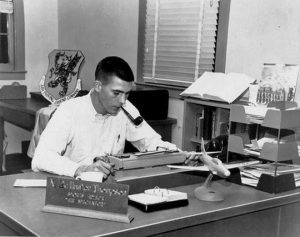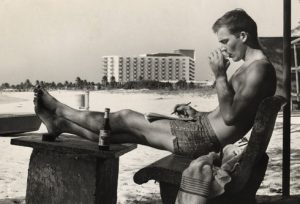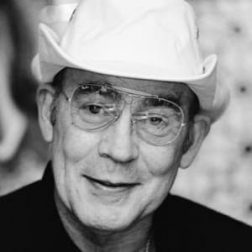


Hunter S. Thompson was many things: author, journalist, drug addict, heavy smoker and even heavier drinker. Some people know his novels or his work as a journalist, others know Johnny Depp played him in a movie. But few know that his writing career began here on Florida’s Gulf Coast.
Yes, his writing career indeed began here. Born and raised in Louisville, Kentucky, Thompson was always interested in writing. His main occupation growing up seemed to be rebellion.
After several arrests during his senior year of high school, Thompson was given the choice between prison and military service. He chose the latter.
He enlisted in the U.S. Air Force and was stationed at Eglin Air Force base in Fort Walton Beach from 1956-1957.

Young Hunter S. Thompson as a sports reporter for Eglin Air Force Base newsletter, 1957.
At Eglin, he worked as a sports editor for the military newspaper, the Command Courier. How did he get that gig, you ask? By lying about his work experience, of course.
In a letter to a friend in 1956, Thompson wrote, “In short, we both know I’m no more qualified for a post like this than I am for the presidency of a theological seminary; but here is one major fact that makes it possible for me to hold this job: the people who hired me didn’t bother to check any too closely on my journalistic background.”
Despite his lack of experience, Thompson successfully put together the sports section each week.
True to his previous mischief, he was frequently caught exaggerating and embellishing stories. In a 1957 Airman Personnel Report, Colonel W. S. Evans wrote that Thompson, “has consistently written controversial material and leans so strongly to critical editorializing that it was necessary to require that all his writing be thoroughly edited before release… Airman Thompson extracted from national media releases and added his flair for the innuendo and exaggeration.”

Thompson on the beach in Florida. Photo: Rollingstone.com
During this period, Thompson also worked as a sports columnist for the local newspaper, The Playground News –known today as the Northwest Florida Daily News. Because the Air Force didn’t allow airmen to hold outside jobs, he wrote under two pseudonyms – Thorne Stockton and Cubley Cohn.
His sports column was colorful to say the least. In an excerpt that originally appeared in The Playground News, later reprinted in Rolling Stone he wrote, “The entire Fort Walton Beach police force is gripped in a state of fear this week… because those are the nights when ‘Kazika, The Mad Jap,’ a 440-pound sadist from the vile slums of Hiroshima, is scheduled to make his first — and no doubt his last — appearance in Fish-head Auditorium.”
And if holding two jobs wasn’t enough, Thompson also worked as a wrestling promoter and took night classes at Florida State University.
He remembers his time in Florida fondly, writing in 1973, “It was a wonderful gig, in retrospect, and at times I wish I could go back to it—just punch a big hatpin through my frontal lobes and maybe regain that happy lost innocence that enabled me to write. At one point, in Florida, I was writing variations on the same demented themes for three competing papers at the same time, under three different names.”
Based on Thompson’s lack of regard for rules, it comes as a mild surprise that he received an honorary (not dishonorable) discharge from the Air Force in 1957. His commanding officer wrote in his discharge, “In summary, this airman, although talented, will not be guided by policy.”

Thompson in his later years
His brief time spent in Florida was only the beginning of Thompson’s legacy as a writer.
After his military discharge, Thompson left the Florida Panhandle and bounced around the country working for several small newspapers. His big break came in 1967, around ten years after he left the Panhandle, when he covered the Hell’s Angels Motorcycle Club for the weekly magazine The Nation. Thompson followed the gang for a year immersing himself within the culture. He published the book Hell’s Angels: The Strange and Terrible Saga of the Outlaw Motorcycle Gangs filled with personal accounts.
The word gonzo is believed to have been first used in 1970 by The Boston Globe editor Bill Cardoso to describe Thompson’s reporting. The widespread success of Hell’s Angels brought Thompson fame and trademarked his unique journalistic style, a style that would be emulated by journalists the world over.
It’s no secret that Thompson’s gonzo reputation also stems from his addiction to drugs and alcohol.
His morning routine (which was rumored to start at 3 p.m.) began with reading the morning paper, cocaine and a cup of coffee.
Thompson went on to write investigative pieces for Rolling Stone Magazine and several of his own novels, many of which were made into movies. Johnny Depp starred as Thompson in the 1998 movie adaption of Thompson’s novel Fear and Loathing in Las Vegas.
After battling depression for many years, this hard-drinking, hard-living man took his own life in 2005 at the age of 67. Thompson’s iconic legacy will continue to live on, but locally his journalism roots from the Panhandle of Florida will always be remembered as the jump start to his lifelong career.
Special thanks to the Northwest Florida Daily News.


